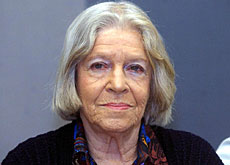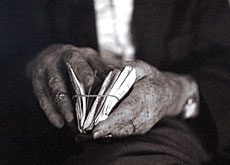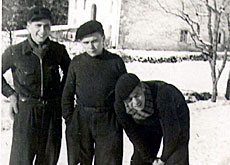Swiss refugee helper requests a pardon

A woman who helped Jews cross into Switzerland during the Second World War is seeking rehabilitation under a new Swiss law.
Aimée Stitelmann smuggled mainly orphaned children into Switzerland from France and was convicted in 1945 of illegally crossing the border.
“Their parents had already been deported to concentration camps and it was vital for them to get out of France if they wanted to stay alive,” Stitelmann told a news conference on Tuesday.
Stitelmann helped around 15 refugees cross the border between 1942 and 1945. The then 20-year-old Jew was finally caught when she tried to lead two refugee helpers into France.
She was sentenced to 15 days in a military detention camp. Ever since, the Swiss authorities have kept detailed records of all her activities.
“It took a lot of convincing to get me to apply for rehabilitation,” Stitelmann told swissinfo. “Personally, I don’t care about being pardoned or not as it all happened so very long ago.
“But I’m doing it so that in future people are less likely to be punished when they help other refugees or asylum seekers.”
The new law, which came into force on January 1, applies to Swiss citizens who were punished for helping victims of the Nazi regime. The rehabilitation does not include any financial compensation.
Humanity
Alain Reinberg, a Jew who fought with the Resistance during the early war years, was one of the people Stitelmann helped.
“The Gestapo were after me and I had to get out of France,” he said. “I’d tried once to get into Switzerland alone but was forced to turn back. It was Stitelmann who managed to get me over.
“I owe her my life.”
But 79-year-old Stitelmann is touchingly modest about her actions. “I had to do it,” she said, shrugging her shoulders. “It was a question of humanity.”
The retired teacher says she managed to suppress fears about her personal safety. Had she been caught in France, she faced being deported to a Nazi concentration camp.
“I remember that it was difficult physically, as we often had to crawl under barbed wire along the border with small children in tow,” she recalled.
“There were also a couple of frightening times when we were forced to cross the border over the Alps, because there were too many dogs and border guards around. That was a long and dangerous walk.
“I had to keep talking and telling the children jokes so they didn’t get scared when I was terrified myself.”
Once they arrived in Switzerland, Stitelmann handed the children over to other refugee helpers who made sure they were kept hidden.
Wartime past
Stitelmann says she feels angered that many Swiss are still burying their head in the sand instead of properly coming to terms with their country’s past.
“I get the impression that people want to forget about the past. But it’s not over and we have to remember what went on,” she told swissinfo.
“I also recall Swiss indifference during the war. People complained of food shortages but forgot about the kinds of dangers people outside Switzerland faced.”
Switzerland accepted around 300,000 European refugees during the war, it also turned away at least 20,000 people, mostly Jews.
But Nils de Dardel, a former parliamentarian who helped bring about the new rehabilitation law, hopes the move will also help to highlight the more positive side of Swiss wartime involvement.
“The law will help highlight the enormous bravery of some Swiss during the 1940s, who until now were not honoured but condemned.
“And even though it can only be applied to Nazi-era cases, the law is also invoked in cases where lawyers are defending people who are helping illegal refugees today.”
A request for the pardon of 26 other people has been submitted to a parliamentary committee.
swissinfo, Vanessa Mock
Aimée Stitelmann helped around 15 refugees cross the French-Swiss border between 1942-1945.
Most of the people she helped were children whose parents had been sent to Nazi concentration camps.
Stitelmann was able to make repeated journeys into France thanks to having both French and Swiss nationality.
Switzerland accepted around 300,000 European refugees during the war, but turned away at least 20,000 people, mostly Jews.

In compliance with the JTI standards
More: SWI swissinfo.ch certified by the Journalism Trust Initiative


You can find an overview of ongoing debates with our journalists here. Please join us!
If you want to start a conversation about a topic raised in this article or want to report factual errors, email us at english@swissinfo.ch.